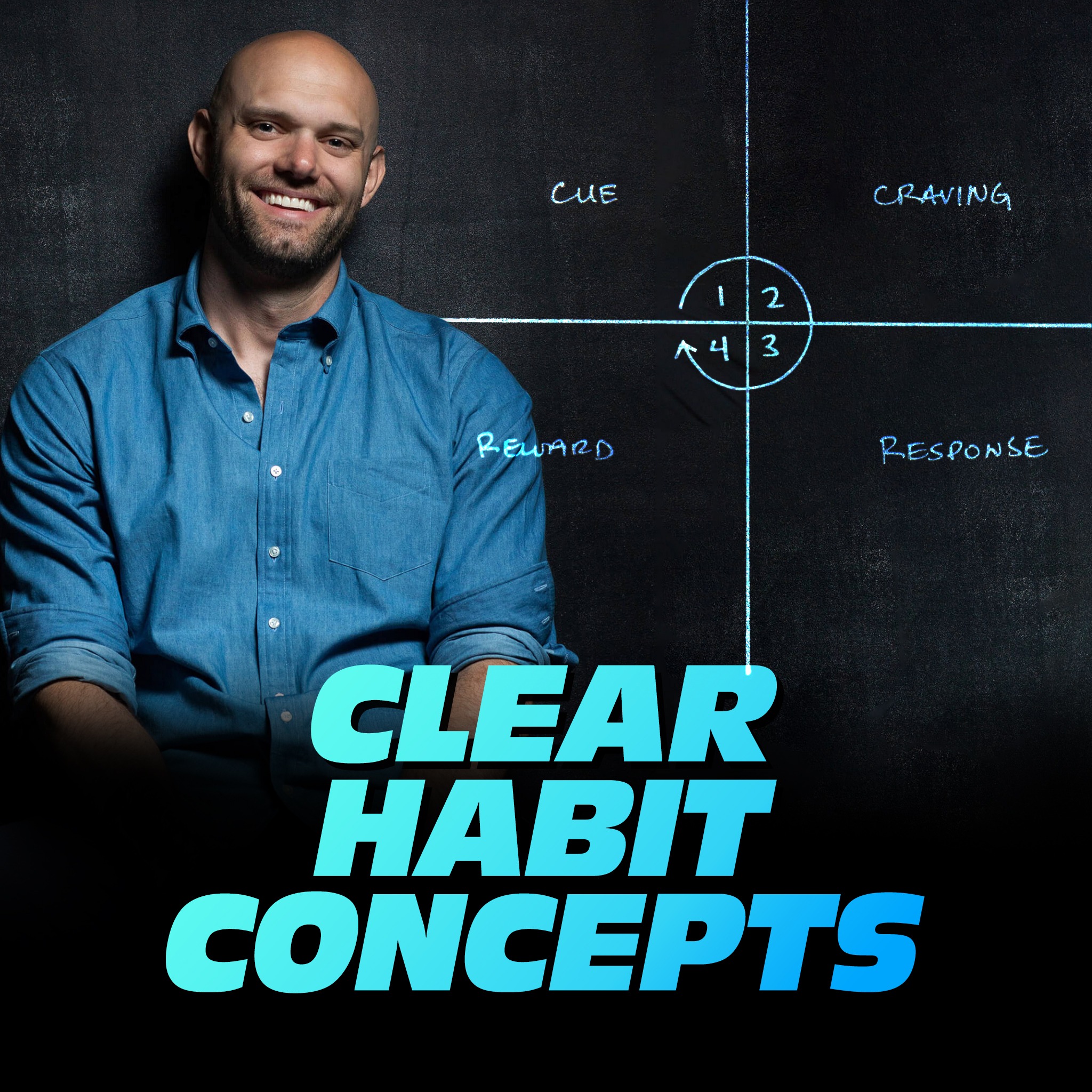Clear Habit Concepts
Habits– they are the small decisions and actions we make every day.
In fact, this Duke University study back in 2006 stated that up to 45% of our behaviors are habitual in nature.
I cannot tell you how many times I’ve heard the saying, “We’re just creatures of habit.”
But it is true! Whether you focus on your personal habits or not, you are building them. It’s a part of being human.
Identity– the fact of being who or what you are.
It sounds simple, but so much in today’s society wraps up in this idea of our identity. The very concept of self-development stems from the idea of identity.
So what if we look at our identity and we want to see a change? It could be a complete change in the way we view ourselves or just in one or two aspects of our identity. But we want to see a different result or outcome then we’re seeing right now.
How do we do this? You may notice I’ve been saying “we” a lot. And that’s because I’m right there with you! I have always been interested in how our habits and identity go hand in hand.
So that’s why when a couple of months back, I had the privilege of interviewing the acclaimed author and habit-expert, James Clear, I knew I had to share his insights on the topic. His book, Atomic Habits, is a life-changer. If you haven’t already, I’d encourage you to pick up a copy and read it.
Part of building better relationships is encouraging and motivating others. I hope this article will be just that for you- an encouragement and motivation to build better habits in your life.
So whether you have a habit of reading blogs, or you are starting a new habit now, let’s dive in!
James’ Background
To help give context of how James came to be an expert on the topic of habits, we talked quite a bit about his upbringing and background in school.
James grew up in the countryside of Ohio. A small community where family was key. He spent every Sunday of his growing up years at his grandparents’ house for Sunday dinner.
I’d have to say that his grandma cooking for twenty people every Sunday would have to qualify her as a saint.
School was interesting for James as well since he tended to have a mix of both academic and athletic interests.
Growing up in a smaller community, he had a wider spectrum of experience and opportunity. Even though he would be the first to admit he did not excel at everything, the benefits he reaped from his educational years are something he will always be grateful for.
There is also something to be said about the makeup of a person. James was and still is innately curious, and if there is one thing I have picked up on my years of interviewing with top entrepreneurs, it is that curiosity is vital!
This curiosity is what inevitably leads James to research the philosophy and science behind habits. He views himself as the bridge between the scientific study and the practical application of forming habits.
Now that you know a little more about James, read on to see the practical principles and concepts about forming habits we discussed on the show.
Habits and Concentric Circles
James boldly stated that the way to change the world is through concentric circles. Not sure what a concentric circle is? Picture the Target bullseye logo.
Concentric circles are circles that have a common core. When it comes to the idea of changing the world, James believes that one must start first with themself and then move outward.
It’s like the ripple effect. One change that leads to another that leads to another that leads to another.
If you were to Google “ripple effect” right now and look at the images, you would see picture after picture of water droplets and the ripples it makes. I’ve even placed one here because it is the best physical representation of the ripple effect.
droplets and the ripples it makes. I’ve even placed one here because it is the best physical representation of the ripple effect.
So how do we see a positive change in the world? Start with you! Take action!
There were two practical thoughts regarding concentric circles that James mentioned in his interview that I wanted to share with you.
First, establish the habit of personal reflection.
Just as water is the physical image to represent the ripple effect, I think of how water is also a reflectable surface.
Make time on a regular basis to pause and reflect on the decisions you have made and the actions you have taken to get you where you are. 
James gave a helpful illustration of why this is important. The average person when asked if they have integrity would say yes. It would be odd for someone to outright state that they do not have integrity in their everyday life.
However, it is easy for all of us to have a “just once” exception when making a decision. But that “just once” can turn into two or three or even ten. And down the road you look back and see that you are no longer in a position that you feel represents what you truly believe.
Develop the habit of reflection. This will allow you to be self-aware and make corrections when necessary. This will also help the change or correction process not be so drastic.
Think about it- it’s much easier to fix a small crack in the foundation than it is to rebuild the house because it fell into a sinkhole!
Second, realize the importance of role model behavior.
People soak up the habits of people around them - James Clear Click To Tweet
I think about the parent-child relationship. Children listen to what their parents say, but they will follow and pick up what their parents do. Our walk talks louder than our talk talks. 
Realizing this importance of role model behavior leads to the acceptance of responsibility when it comes to our actions.
James talked about the need of changing our thought from “someone should do something about that” to “I should do something about this.” And I love this!
No one can make the decision for you to build better habits. It has to come from you.
Decide to surround yourself with people who produce the behavior you wish to emulate. Become the role model you want to see! Focus on your individual actions rather than just wishing others actions would change.
Signals of Progress in Habit Development
I absolutely loved this part of the conversation, because James and I discussed his journey from college to writing and how he eventually got a book deal after writing 2 articles a week for 3 years.
He talked about the restlessness we all feel when we work on habit building for days, weeks, months, and even years. Disappointment can come when we do not see the results we wish to see in the timeframe we expect.
So James talked about the importance of signals of progress. See in his early days when he would post an article, just one person responding to him to tell him they enjoyed his article was enough to keep him going.
He knew he was on the right path because he would receive small signals of progress along the way before the big result of the book deal came his way.
We often miss the small signals, and therefore, we complain or get discouraged to the point of quitting.
But James beautifully illustrated the monumental importance of small signals.
Picture yourself in a 25 degree room with an ice cube resting on a table. If you were to start warming the room up by 1 degree, you wouldn’t see or really feel much change between the 25th and 26th degree. Or between the 28th and 29th.
But the small change between the 32nd and the 33rd degree while no different than the previous one degree changes will start to show a very different result. See, the freezing point of water is 32 degrees.
This means that this one small change has now started the melting process for the ice cube. Your room with a table inside will now have a slightly smaller ice cube until it will eventually become a puddle of water.
To complain that the work being done between degrees 25 and 31 seems ridiculous. James says, “The work was not wasted. It was just being stored.” And that is a mind-blowing thought!
What small signal of progress have you seen in your habit development? Was there maybe a signal you missed? I’d encourage you to write them down in a journal or habit tracker. Having a visual of your habits and the small signals of progress you see will do great things for building habits that stick!
Identity Based Habits
An important concept to understand when it comes to developing habits is it is not about a list of habits that you are implementing into your life. It’s about changing your identity.
James wrote about identity-based habits in his book, Atomic Habits, and we spoke about it on the show.
Let’s go back to our concentric circles. The core of who you are is your identity. The next circle is your process, and the outermost circle is your results.
If you want to see certain habits develop in your life, you have to change your identity.
Right now, your actions are a reflection of your current identity. Our identity is something we believe about ourselves whether we realize it or not.
A majority of our goals when it comes to our habits are based on the results we want to see. We want to go to the gym to lose 20 pounds. We want to have more time in the day so we set our alarm to 5 am.
While this is all good and fine, these habits will not truly stick until they go deeper into who you are. Identity-based habits are focusing on who you want to become not just what you want to achieve.
If you wish to become a healthy, active person, what are some of the behaviors that person would display?
Want to become a writer– what is the mindset that a writer would have?
Desire to have more time in the day– what are some steps that person would take to make that happen?
See, once you change who you believe you are, the habits and behaviors will come naturally.
If you are focused on identity, then each action you take will be proof that you are succeeding. It will lead to the confidence you need to believe in yourself. The results will inevitably come.
James gave several common examples that are often seen especially around the new year. Here’s one.
Want to lose weight? Focus on becoming an active person. What would an active person do? Never miss a workout.
Track your workouts, and every time you check it off, you are confirming to yourself that you are an active person!
This is where the real power in habit development lies. The power is not in changing your behavior. It’s in changing your identity!
Lagging Measures
One of the final concepts we talked about was how we measure our habit development. There were two things that stood out to me in our conversation.
1- We have to choose the right form of measurement.
This goes hand in hand with identity-based habits. If you want to lose weight, your goal is to become a healthy, active person. So rather than measuring your progress by how quickly the number on the scale goes down, measure it by the number of times you went to the gym or participated in a strenuous exercise.
We can easily fall into the trap of comparing and measuring our progress with measures at a different pace than what our habit requires.
2- Understand that “your results are a lagging measure of your habits”
James told of a buddy who had been doing well in business. When his friend commented on how things had been going for him, James’ buddy simply stated, “It means I was killing it six months ago!”
The results we benefit from today are from the actions we took previously. James is the author of a New York Times best-selling book, Atomic Habits. But this result is from the years of writing two articles a week. He was consistent. He took feedback and noticed the small signals of progress. His goal was not to write a best-selller. His goal was to be a writer. And he put in the work and developed the habits he needed to become the person he wanted to be.
And now, his successful business is centered around the fact that he lived what he wrote.
Conclusion
My conversation with James has been one of my favorites in the 400 plus episodes I have recorded.
His knowledge and understanding of habits and how they help us develop a life we love is astounding.
I cannot recommend his book and website enough for those of you who would love to learn more on the topics of habit building.
What is an identity-based habit you want to start developing today in your life or in your network? Let me know in the comments below, and don’t forget to share this post with someone you think it would help.




0 Comments